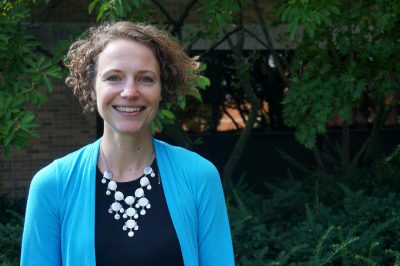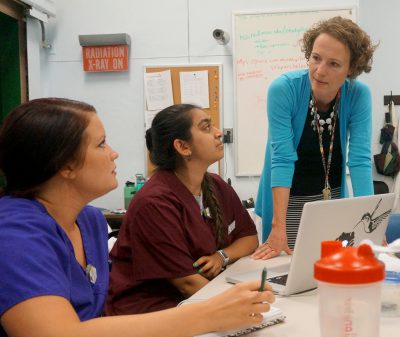Last year, the MSU College of Veterinary Medicine began its Strategic Thinking process and has now created its 2016–19 Strategic Plan. The plan uses seven key values to advance three strategic goals. One of these goals is Curriculum Reinvention, an area in which Dr. Laura Nelson, associate professor in the Department of Small Animal Clinical Sciences, is extremely passionate.
“Our faculty are amazing, but if we want to stay ahead of the curve, we need to reinvent the way we are teaching our veterinary students,” said Dr. Nelson. “We have to evaluate our traditional methods and actively seek what’s new in the world of teaching. We need to become experts on education, not just veterinary medicine.”
Diving In
The Curriculum Reinvention initiative will design a learner-centered curriculum that prepares career-ready, high-value graduates by tackling multiple elements of curricular design and success. These elements have been broken down into key working groups. Dr. Nelson convenes the Educator Development working group. She and her team are defining faculty skills that will support the reinvented curriculum. They are also developing a plan to help faculty attain those skills.

Dr. Nelson said the group will support educators by improving instructor and student efficacy and wellbeing. “We’re creating a comprehensive system that will develop and support high-quality pedagogy within the College’s doctor of veterinary medicine curriculum.”
The working group’s strategies include promoting faculty knowledge of current educational theories and practices, increasing technology awareness and availability, and reinvigorating the current faculty mentorship and peer support program.
“A lot of what we’re trying to do is come together as a community of educators that are interested in educating better,” said Dr. Nelson. “To do that, we need to continue educating ourselves, have access to new technology and resources, and support each other by constantly assessing our progress and working toward a collaborative culture.”
Clinical Impact

Educator Development won’t just improve teaching in the classroom. After their fifth semester, veterinary students begin clinical rounds at the MSU Veterinary Medical Center. Students work closely with clinicians and residents to learn and perfect the surgical techniques and medical knowledge that they will take with them after graduating.
Dr. Nelson and her working group want Educator Development to fill in some of the blanks that students may encounter during clinical learning. She cautions against too much teaching by example without enough applied education theory.
“As a student, it’s not enough to learn just by watching someone do something,” said Dr. Nelson. “Sure, students can watch and learn to mimic someone. But that doesn’t really teach the student why it’s done that way or why not another way. It also doesn’t teach them to think critically about the technique, or to apply that knowledge elsewhere.”
To make this adjustment, the working group is focused on training clinicians to convey concepts and details to students while demonstrating technique.
“Educators that have basic fluency in the applicable educational theories and practices are much more likely to be the better teachers,” said Dr. Nelson. “Being a subject matter expert is not enough. It’s doesn’t make you a good educator.”
Dr. Nelson said she is confident that the Educator Development working group will contribute to the College’s legacy of academic success. “In the world of veterinary medical education, there is room for us to strengthen training by incorporating educational theory and practice. We have an opportunity here to develop true educational competence in our industry. We can change things for current and future educators.”
